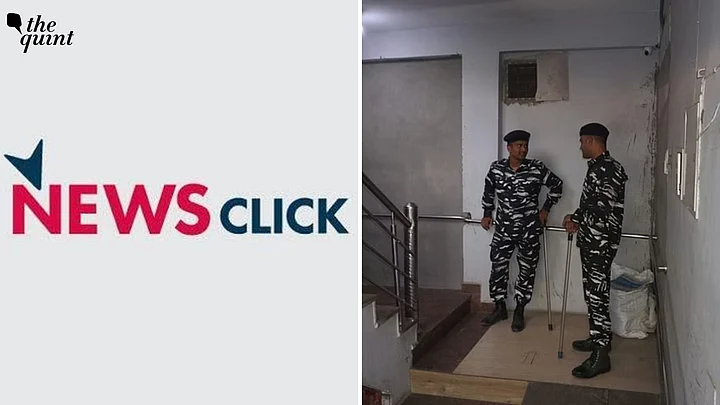The early morning raids, seizure of phones and laptops, and the ongoing questioning of several individuals – including journalists and commentators – associated with the NewsClick media organisation on Tuesday, 3 October have led to criticism from media bodies, including the Editors Guild of India (EGI) and the Press Club of India (PCI).
"The EGI is concerned that these raids are yet another attempt to muzzle the media. While we recognise that the law must take its course if actual offences are involved, the due process has to be followed. The investigation of specific offences must not create a general atmosphere of intimidation under the shadow of draconian laws, or impinge on the freedom of expression and the raising of dissenting and critical voices," the body said in a statement.
"We remind the government of the importance of an independent media in a functioning democracy, and urge it to ensure that the fourth pillar is respected, nurtured and protected," the EGI further added.
The PCI said it was "deeply concerned" about the raids, adding that they “stand in solidarity with the journalists and demand the government come out with details."
"The Press Club of India is deeply concerned about the multiple raids conducted on the houses of journalists and writers associated with NewsClick. We are monitoring the developments and will be releasing a detailed statement," it said in a post on X (formerly Twitter).
Meanwhile, Digipub News India Foundation (DIGIPUB), a 11-member digital-only news association "strongly condemned" the action against journalists and said that the country has been in a "downward spiral on press freedom and other ranking on civil liberties and human rights."
"This coordinated action of the police against news professionals and commentators clearly violates due process and fundamental rights. This has taken the government's pattern of arbitrary and intimidatory behaviour to a whole other level," DIGIPUB said in its statement.
Addressing the protest meeting called by PCI, DIGIPUB member and The Wire's Founder Siddarth Varadharajan said, "To be able to proceed against an entire news organisation under the charge of being terrorists suggests how unhinged the attack on Press freedom is."
"The Press is extremely critical to a functioning democracy. The attack on it has come to a very serious point with actions on members of the Press today. We have to speak with one voice on this," Varadharajan added.
DIGIPUB also demanded investigating agencies to "cease raiding the homes of journalists, seizing their devices, and taking them to the police station for questioning without prior notice and in violation of their right to life and liberty."
A protest meeting was held at the Press Club of India against the raids. The meeting, attended my members of PCI, DIGIPUB and other journalist news bodies resolved to continue protest for "defending media freedom."
In the meeting, journalist bodies decided to conduct protests in Delhi this week in response to the raids.
The Mumbai Press Club, too, issued a post on X raising concern over the raids, saying that they urge "an unbiased investigation" and call upon the Delhi Police "to desist from what is perceived as a targeted harassment campaign against these journalists.”
'Arbitrary Practices Violate Privacy'
The Internet Freedom Foundation (IFF) said that "such arbitrary practices violate the right to privacy and negatively impact press freedom in derogation of due process of law."
Meanwhile, calling the raids a "grave concern," the Foundation for Media Professionals said, “We ask for greater disclosure by authorities on the raids today. The seizure of phones and laptops of journalists without legal safeguards jeopardises freedom of the press."
Shabnam Hashmi, the sister of historian and activist Sohail Hashmi, who was raided, noted in a post that the stifling of the democratic voices of journalists, intellectuals, artists, and common civilians goes unabated under this government.
“In the name of legal proceedings, what the common people face today is sheer intimidation, harassment, and fear by the Indian state. We will not be silenced by such intimidating tactics by the government to stop citizens exercising their constitutional rights,” Hashmi wrote.
Several commentators, including the Internet Freedom Foundation’s Apar Gupta, noted that the seizure of digital devices is worrying and part of a trend.
"The seizure of a journalists' phone and digital devices is a wider trend that requires reform and safeguards. It is important for us to remember earlier this year the raid at the BBC India offices," Gupta noted.
Meanwhile, addressing a press conference in Odisha's Bhubaneswar, Union I&B Minister Anurag Thakur said, “The probe agencies are independent, and they are doing their jobs by following rules. I don’t need to justify the raids. If someone has done something wrong, the probe agencies do their job. It’s nowhere written that probe agencies can’t take action if money has come to you from the wrong sources or something objectionable has been done."
What Happened on Tuesday Morning?
The Delhi Police on Tuesday, 3 October, allegedly conducted raids at over 30 locations, including the residences of journalists, in connection with a probe into the funding of news portal NewsClick.
The raids took place in the residences of NewsClick Editor Prabir Purkayastha, video journalist Abhisar Sharma, political commentator and senior journalist Aunindyo Chakravarty, veteran journalist Paranjoy Guha Thakurta, Bhasha Singh, Bappa Sinha, and Urmilesh.
A fresh case has been registered by the Delhi Police Special Cell against NewsClick under the stringent Unlawful Activities (Prevention) Act or UAPA.
Read our detailed report on the raids here.
During the raids, the Special Cell seized electronic evidence, including laptops and mobile phones, and took data dumps of hard disks, a Delhi Police official confirmed to The Quint. While no arrests have been made so far, people are likely to be detained post-questioning, police sources said.
